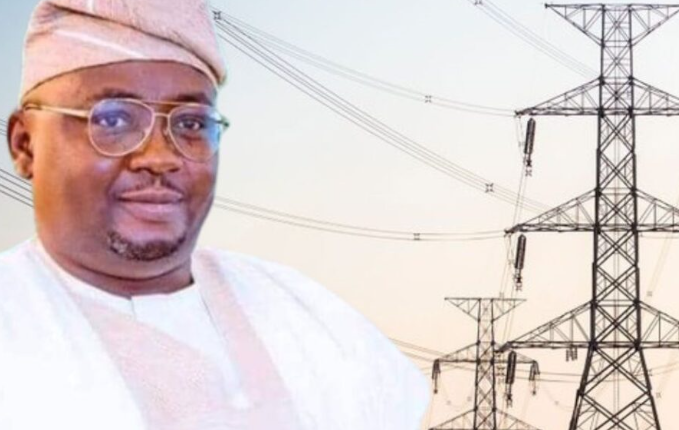[BREAKING] Adebayo Adelabu: Electricity Subsidy Now N200b Monthly, Worries Power Sector

The Minister of Power, Chief Adebayo Adelabu, has raised alarm over the growing burden of electricity subsidies on the federal government, stating that monthly payments now exceed ₦200 billion.
Speaking at a two-day retreat organized by the Senate Committee on Power, Adelabu disclosed that the government is currently indebted to electricity generation companies (GenCos) to the tune of ₦4 trillion, including ₦1.94 trillion for 2024 alone.
In a statement issued by his media aide, Bolaji Tunji, the minister warned that maintaining the current tariff structure is no longer feasible. “The sector also faces a ₦4 trillion subsidy backlog owed to generation companies, including ₦1.94 trillion for 2024 alone. With monthly subsidy shortfalls now hitting ₦200 billion, the Minister warned that maintaining current tariffs is ‘unsustainable,’ straining public funds needed for infrastructure upgrades,” the statement read.
Adelabu said the power sector, though crucial, is being choked by chronic underinvestment in the distribution segment, which he described as the weakest link. “To salvage the sector, we will soon embark on restructuring underperforming DisCos and tightening enforcement of performance benchmarks,” he said. “However, without urgent capital injection into distribution networks, gains in generation, including a historic 6,003MW output in March 2025, and transmission upgrades, such as 61 new transformers deployed in 2024, will fail to translate to reliable household supply.”
Highlighting disparities in performance across Distribution Companies (DisCos), the minister accused many of failing to meet expectations. “We need to get tough with the DisCos, as they can easily frustrate all the gains we have made. They have disappointed us in performance expectations. Whatever we do in generation does not mean anything to consumers if it is frustrated at the distribution points,” he stated.
Reflecting on the 2003 sector restructuring, Adelabu criticized the lack of genuine technical partnerships among DisCos. “In the 2003 restructuring of the sector, the DisCos were supposed to have technical partners, but a lot of them showed partnership with foreign companies for that purpose which lasted for about three months. Immediately they took over, those companies left. So we need utility companies that can invest in the sector to improve infrastructure, improve service,” he said. “A lot of them went to the banks to take loans to buy the assets, after taking over, instead of providing infrastructure, they are taking out the money to pay the loans.”
Despite tariff adjustments that increased market liquidity by 70 percent and raised revenue from ₦1 trillion in 2023 to ₦1.7 trillion in 2024, revenue shortfalls remain stark, particularly in the North. “In the fourth quarter of 2024, DisCos in the North remitted just ₦124.4 billion (30 percent) of their ₦408.86 billion invoice, with Abuja DisCo accounting for 85 percent of Northern payments. Southern DisCos fared slightly better, remitting ₦254.6 billion (67 percent), though 70 percent of this came from Lagos DisCos alone. These discrepancies are due largely to crumbling infrastructure outside economic hubs, where underinvestment has left networks dilapidated,” he said.
Addressing the issue of metering, Adelabu acknowledged its central role in revenue generation and consumer trust. He noted the launch of a ₦700 billion Presidential Metering Initiative and a World Bank-supported plan targeting 4.3 million meters by 2025. “Closing this gap is fundamental to fair billing and financial sustainability,” he said, adding that “we are not there yet due to underinvestment and operational inefficiencies.”
The minister also announced plans to attract private investment into grid infrastructure and regionalize transmission networks to reduce failure risks. He said, “The 70 percent remittance by the two DisCos in Lagos reflects better infrastructure than what obtains in the northern networks.”
Adelabu outlined government efforts to boost power supply in northern Nigeria, including the development of the 1,000MW Makurdi hydropower project and the revitalization of the 215MW Kaduna thermal plant, which is currently at 87 percent completion. “Efforts are on presently to restore this power plant,” he said.
He added that the Katsina State government has expressed interest in taking over the abandoned 10MW wind farm. “The State government has expressed desire to take this up with some private investors and we have commissioned a feasibility study to concession the farm,” he noted.
Calling on lawmakers to enact tougher legislation to protect electricity infrastructure, Adelabu warned against treating vandalism and power theft as minor offences. “Vandalism should not be treated as a civil offence but a criminal issue,” he emphasized. “Power theft, nonpayment of bills by consumers, and illegal connections are critical factors that need to be tackled.”
Despite the challenges, Adelabu reported that the national grid has remained stable throughout the year. “The level of stability on our grid today is not by accident but hard work and expenditure. In 2024, TCN installed 61 new transformers by either replacing aged ones or building new ones. Also in 2025, within the first four months, TCN installed about 13 new transformers and there are high-capacity transformers ranging from 10 megawatts to 300 megawatts. Put together, they run into hundreds of million dollars to install and these are what our people still go out to vandalize,” he said. “Our towers are toppled by saboteurs and vandals, we have illegal connections, and people tampering with meters.”
Adelabu stressed the need for legislation and public vigilance to protect “national assets that belong to every Nigerian.” He also called for more funding for the Transmission Company of Nigeria (TCN), which he said is under financial strain. “They are short of funds, they operate solely on their Internally Generated Revenue (IGR), which has been nose-diving over the years. What they get monthly cannot even pay their salary, not to talk of maintaining ageing infrastructure or expanding transmission networks. There should be a way to accommodate TCN in appropriation,” he said.
